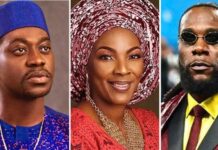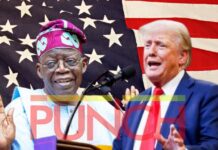A political storm is brewing within the All Progressives Congress (APC), Nigeria’s ruling party, as a flood of defections from opposition parties threatens to reshape its internal power dynamics and test the party’s capacity to manage competing ambitions.
While the APC appears to be consolidating its grip on power ahead of the 2027 general elections, analysts say the recent wave of crossovers could destabilise the party from within and trigger leadership struggles with far-reaching consequences.
Over the last several months, the APC has witnessed an influx of high-profile politicians switching allegiance from opposition camps, particularly the Peoples Democratic Party (PDP), Labour Party (LP), and the New Nigeria People’s Party (NNPP).
This development came as a shock to many observers, especially considering that Okowa was the PDP’s vice-presidential candidate in the 2023 general elections. That he would abandon the party he represented on a national ticket just two ago underscores the level of disarray in the opposition and the gravitational pull the APC now exerts.
The mass exodus is not limited to Delta. In Akwa Ibom State, Governor Umo Eno recently expressed open support for President Bola Tinubu and the APC-led federal government. Although he has not formally declared for the APC, political analysts see his public posturing as a signal that another high-level defection may be imminent.
Similar developments have been reported in states like Rivers, Enugu, Ebonyi, and Edo, where PDP and LP structures are reportedly weakened, and negotiations are ongoing between their leaders and top APC officials. With each passing week, Nigeria’s political landscape is being redrawn, and the APC is fast emerging as the dominant party in states where it once held little influence.
Defections driven by power, not principle
Despite appearances, the defectors’ motivations are far from ideological. According to political commentators, most of these crossovers are calculated moves by politicians seeking to remain relevant, evade corruption probes, or secure access to federal resources and protection.
ADVERTISEMENT

“The rate of defections clearly shows these moves are more about political survival than policy or ideology,” said Laja Ogunyemi, a political analyst. “These are not acts of conviction but of convenience. Politicians are positioning themselves to benefit from the spoils of the ruling party, especially as the 2027 election cycle approaches.”
The timing of the defections, occurring just as Tinubu begins his second year in office, is also telling. Many of the defectors are either under investigation by anti-graft agencies like the Economic and Financial Crimes Commission (EFCC) or have ongoing political battles in their states. By aligning with the APC, they gain proximity to federal power, which has traditionally served as a buffer against legal and political threats.
“Let’s be honest, some are running from the EFCC,” said Temitope Musowo, a political commentator. “Once you’re with the ruling party, your troubles tend to vanish or get delayed. That’s the reality of our system.”
Delta State: Power struggle unleashed
Perhaps no state better illustrates the internal fallout of these defections than Delta. The entry of Oborevwori and Okowa into the APC has sparked a fierce leadership contest within the party. Until recently, Ovie Omo-Agege, former deputy senate president and the APC’s 2023 gubernatorial candidate, was widely regarded as the leader of the party in the state. But the new power dynamics threaten his status.
At a recent political reception, Oborevwori said: “The governor is in charge, and we are taking charge. I don’t believe in any faction, whether the Omo-Agege or Festus Keyamo faction, everybody must queue.”
His statement signalled a clear intention to take over the party’s structure in Delta, in line with the traditional norm that sitting governors who join a party become its de facto leader in the state. But Omo-Agege, who led the APC’s campaign in 2023 and kept the party afloat in a state long dominated by the PDP, is not backing down.
In a statement, he emphasised that discussions were ongoing with national APC leaders and the Progressive Governors Forum to manage the new realities: “In line with the outcomes of deliberations with the national leadership of our party, the Progressive Governors Forum, and Delta APC stakeholders, I wish to assure all stakeholders that any issue arising from this development is being carefully considered and managed with prudence and foresight.”Related News
Still, tensions are high. Sources close to the Delta APC describe the atmosphere as ‘tense and unpredictable.’ While party elders are calling for unity, younger politicians aligned with Omo-Agege fear being sidelined in the emerging order.
“There are conditions given to high-ranking defectors before accepting them into the party. The governor is the leader of the party in every state,” said Ajibola Oduwole, a lawyer and public affairs commentator. “They would have to look for other ways to compensate Omo-Agege, or else the party would have to weigh its options.”
He added: “There would have been several meetings and compromises before the governor was allowed into the party. And I am sure Omo-Agege cannot feign ignorance of this. Unless, of course, the party feels the governor is a more valuable addition to its fold than persons like Omo-Agege.”
Old members resentful, feel sidelined
Beyond Delta, similar sentiments are brewing among long-time APC members in other states. Many are grumbling over the preferential treatment defectors appear to be receiving. A senior APC chieftain in the Southwest, who preferred not to be named, said: “We built this party from scratch when it wasn’t popular. We stood by it during tough elections. Now people who mocked us are joining and being promised automatic tickets. It’s unacceptable. The party must manage this or face rebellion.”
ADVERTISEMENT
This sense of betrayal could become explosive during the 2026 and 2027 primary seasons. Many of the new entrants are reportedly being assured of tickets or leadership roles, a move that risks alienating foundational party members and triggering parallel structures or defections back to the opposition.
“Many of these new members will be shocked when the primaries come,” the chieftain continued. “They think it will be automatic, but we won’t allow it. If care is not taken, this could lead to mass defections in reverse.”
Fear of a one-party state
The ongoing implosion of the PDP, coupled with the weakening of LP and NNPP, has raised concerns among civil society actors and political observers that Nigeria may be drifting toward a one-party state. Already, federal lawmakers, former governors, and top party financiers are leaving their parties, citing irrelevance and lack of internal democracy.
Musowo argued that the fluid nature of these defections is symptomatic of a deeper problem, Nigeria’s lack of institutionalised party ideology and weak democratic norms.
“It’s like political nomadism,” he said. “Many of these politicians still keep lines open to their former parties. They’re hedging their bets. If the APC doesn’t offer them tickets or influence, they’ll quietly return.”
The Buhari-CPC bloc rift
Interestingly, while the APC is gaining defectors from outside, it is also facing internal cracks within its legacy blocs, particularly the Congress for Progressive Change (CPC) faction. Recently, reports surfaced that some governors have reached out to former President Muhammadu Buhari to help halt the defection of his loyalists, including former Governor Nasir El-Rufai, to the Social Democratic Party (SDP).
The CPC bloc has long felt marginalised under the Tinubu administration, which leans heavily on the Action Congress of Nigeria (ACN) faction. As more CPC leaders explore alternative political platforms, the APC risks losing a crucial part of its founding coalition.
2027: A house divided?
With less than two years to the 2027 elections, the APC faces a critical test of its internal cohesion and capacity to manage ambition. The ruling party’s dominance at the federal level and in most states may be impressive on paper, but the ground reality is more fragile.
“This is not just about numbers,” said Ogunyemi. “The APC must decide whether it wants to be a coherent party with principles or just a vehicle for power. If it’s the latter, it will implode eventually.”
As Nigeria continues to grapple with economic hardship, insecurity, and democratic backsliding, the consolidation of power in one party raises serious questions about accountability, checks and balances, and electoral integrity.
The coming months will reveal whether the APC can manage its internal contradictions, or whether the flood of new allies will wash away its foundations.
























